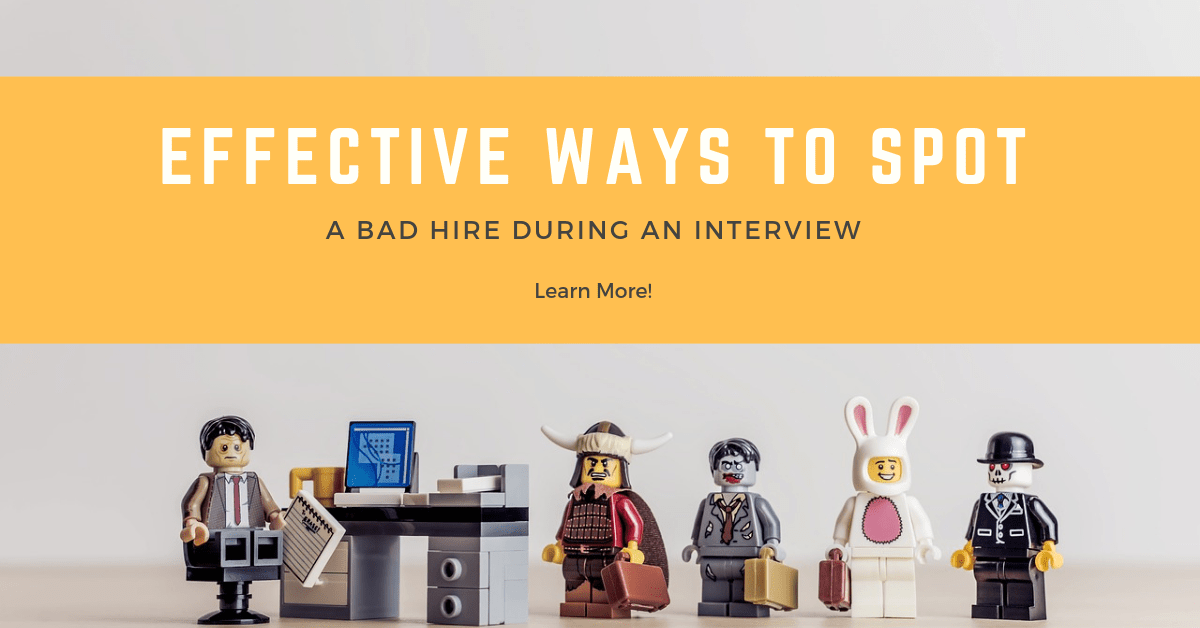
Effective Ways to Spot A Bad Hire During An Interview
How costly can a Bad Hires in Interviews be? One hiring mistake might price up to 5 times the bad hire’s annual remuneration. Companies can’t afford to hire mistakes, which are pricey and can erode employee morale.
Hiring an employee is a very important decision. It’s a fragile choice because hiring the wrong person can be very costly and catastrophic. Many employers make the mistake of hiring a bad employee because their number one concern is filling a position. Instead, employers should focus on filling the position with the right employee. To avoid such mistakes, one should lean to below suggestions to spot a nearly bad hire:
Unprepared for the interview
All candidates should go into an interview with basic knowledge about the company and its mission, a succinct summary of their professional experience, and a strong case about why you should hire them. If you raise them to inform you why they’re curious about the position and that they provide you with a blank stare or a generic response, they may not have taken the time to be told regarding the corporate.
Ask questions related to the job they’re applying for
This is a big mistake I see a plenty of hiring managers build. If the question does not relate to the position, or the candidates’ ability to try and do the duty, then it should not be asked. An interview is not the time to attempt to make a personal connection, the reason being this it tends to allow the candidate to control the interview, instead of the interviewer extracting the knowledge he or she must to build an informed and objective call.
Trigger potentially toxic questions.
Question the person on the five things he/she liked least regarding his or her last company. Asking, for one thing, is pretty common. Catechizing for five pressures the person to reveal either strategic insights or signs of toxicity. The answers would tell a lot about their personality and can be used to picture cultural adaptability.
Short on details
Though the candidate shouldn’t ramble on about their previous roles and responsibilities, they should at least be able to give you a few details about their capabilities and skill level. If they can’t coherently (and succinctly) explain how their experience makes them a fit for your team and the company as a whole, then they may not have the confidence or ability to succeed in the role.
Not owning up to their mistakes
Everyone makes mistakes during their careers; it’s just a fact of life. But where the red flag lies, is when a candidate doesn’t admit them or fails to turn the experience into a positive. For instance, if you ask them to explain a scenario when you’ve made a mistake and they either blame someone else or simply state the good parts, this isn’t an honest reflection on events. Ideally, a candidate should tell you how they rectified the problem and learned from it. If they waste time bashing their old employers, they won’t have any issues doing the same to you as well.
Lack of growth
Career growth is a huge factor for a lot of ambitious professionals. Try asking them:
“Why did you want to leave your previous role?”
“What lessons have you learned in your previous role(s)?”
“Where do you see yourself in five years?”
These interview questions will allow candidates an opportunity to tell you how ambitious they are, explain why career growth might have stagnated, and whether they have the initiative to want to learn new skills moving forward. On the flip side, if a candidate comes across like they want to grow at an unrealistic rate which doesn’t suit the particular job role, this might be a cause for concern as they will probably become restless and leave early on.
Solutions to deal with a Bad Hires in Interviews
The above points can help you avoid a Bad Hires in Interviews, but in case you couldn’t figure out one during the interview process you can fix/deal with it by following below steps:
Deal with the situation immediately, take immediate actions, and don’t let it fester.
Determine if their deficiencies contradict what they said or claimed during the interview process, or what they showed on their resume.
Get specific and detailed feedback from co-workers and supervisors.
Determine if it is best to let them go, or their blunt edges can be sharpened with little efforts?
Be clear regarding your/their legal rights if you fire them.
For more about Recruitment updates follow our Insights for more info Contact Pragna Solutions for your all RPO Recruiting and Offshore Recruiting Solutions.